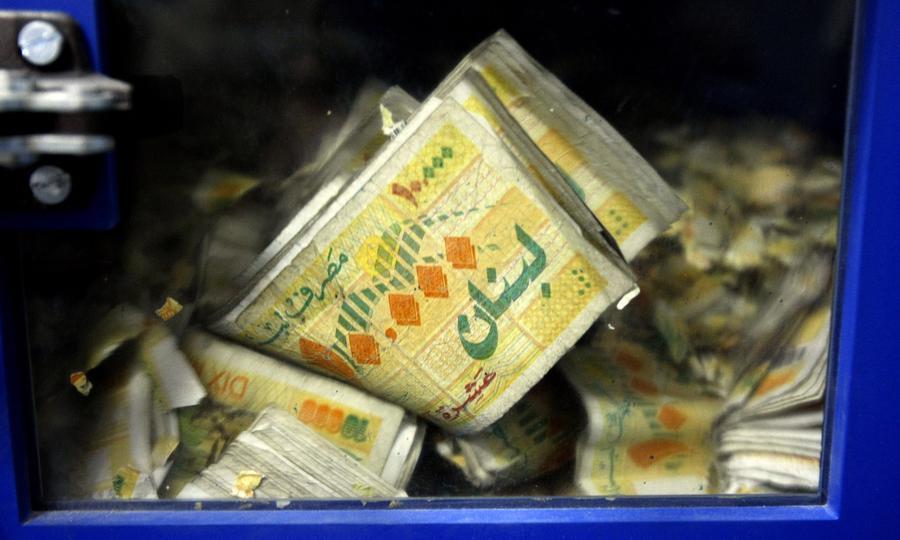
Anxiety grows in Lebanon as US dollar peg slips
(MENAFN- Asia Times) Cars lined up at gas stations on Friday night in Lebanon as residents of the Eastern Mediterranean nation braced for an impending strike and fears over possible shortages.
A shortage of US dollars in the country has hit businesses like gas stations especially hard, as they are required to pay for imported fuel in dollars, but are paid by customers in Lebanese pounds.
The lines were gone by Saturday morning, as an agreement was hammered out allowing station owners to pay fuel importers in local currency; in turn, the government said it would guarantee importers a fixed exchange rate for dollars.
The crisis is far from over, however, as doubt grows daily over the local currency's two decade-old peg to the dollar.
"I guess they found a solution for now. But we don't know what's going to happen down the line," a Total gas station employee in the Mount Lebanon governorate told Asia Times.
While stations are required to sell fuel at the official exchange rate (LBP 1507.5 to $1) set by the central bank, black market rates have been popping up elsewhere.
The employee, who hails from Egypt and converts his salary each month to dollars to send home to his wife and two children, says the conversion rate is slowly creeping up.
"The problem is, we have the same issue in Egypt," he said bleakly.
No Lebanese allowed
In 1975, the year the Lebanese civil war broke out, the Lebanese pound, often referred to as the lira, was just under 2.25 to the dollar. It spiked multiple times during the course of the conflict, entering a period of hyperinflation in the 1980s, which convinced authorities to peg the national currency to the dollar. It has held at 1,507.5 to $1 since December 1997.
When it comes to simple daily transactions for things like taxi rides and street food, the rate is often simplified at 1,500 to the dollar.
This week, however, black market rates began emerging, with small businesses desperate for dollars and banks anxious to keep conversions at a minimum.
Lebanon's widespread cash transfer offices, where phone bills can also be paid, have meanwhile started charging a premium for customers wishing to pay in Lebanese pounds, or are refusing them entirely.
One such office in the Metn district, when asked Friday whether customers could still pay in local currency, replied: "Sure, but it's going to cost you extra."
For a bill of $70, the attendant said he would charge LBP 107,500 – a black market rate of LBP 1,535.7 to the $1 as compared to 1,507.5.
The difference, in this case was LBP 1,975 ($1.30), or about the price of a shared taxi ride within Beirut.
A money transfer outlet in Beirut, when asked about paying a monthly cell phone bill, said it was no longer accepting local currency at all.
Dollar education
The banking sector meanwhile appears to be trying to prevent its dollar supply from being depleted.
Lebanon resident Vanessa Breeding, a US employee of American University in Beirut with a dual account in Lebanese pounds and US dollars, said she was unable for successive days this month to convert her salary to – normally subject only to a $2,000 per day limit and easily done at any ATM or online.
Finally, a bank teller advised her to try "try after midnight tonight." She later understood that regardless of her daily limit, the bank had its own limit that was being maxed out.
The American University in Beirut, along with Lebanese American University and Lebanon's Notre Dame University – meanwhile this fall semester began denominating tuition fees in dollars, as opposed to the local currency.
While students will still be able to pay in Lebanese pounds, the amount will be subject to the official exchange rate on the given day. Faculty and staff, notably, are still going to be paid in local currency.
Quelling fears
In December 2018, reports emerged that approximately 855 billion ($570 million) worth of Lebanese pound deposits had been converted to dollar accounts, raising fears that high net-worth individuals in the know were growing skittish.
The revelation raised fearsthat Lebanon's peg to the dollar, consistently upheld as a sacrosanct bedrock of stability, was slipping.
In January, the central bank issued a circularrequiring money exchange offices to pay out electronic transfers exclusively in Lebanese pounds, regardless of the original denomination.
The decision sparked anxiety among the 4 million populace – who received remittances worth US$1.2 billion last year alone – that the banks would soon be forced to follow suit.
The central bank quickly clarified that its decision would be limited to non-financial institutions and banks could still honor transfers in dollars.
The banking sector has meanwhile offered steep interest rates to keep clients from converting their accounts to dollars.
Until now, a triangle of mutually assured destruction between Banque du Liban, the banking sector, and the political and business elite has kept Lebanon's economy afloat. Using a mechanism known asfinancial engineering , private banks provide the central bank with foreign currencies in exchange for immediate profits in Lebanese pounds.
Global credit rating agency Fitch warned in August that this formula may not hold, downgrading Lebanonfrom B- to a distress grade of CCC.
Also read: US Treasury tightens yoke on Lebanese banking

Legal Disclaimer:
MENAFN provides the
information “as is” without warranty of any kind. We do not accept
any responsibility or liability for the accuracy, content, images,
videos, licenses, completeness, legality, or reliability of the information
contained in this article. If you have any complaints or copyright
issues related to this article, kindly contact the provider above.

















Comments
No comment